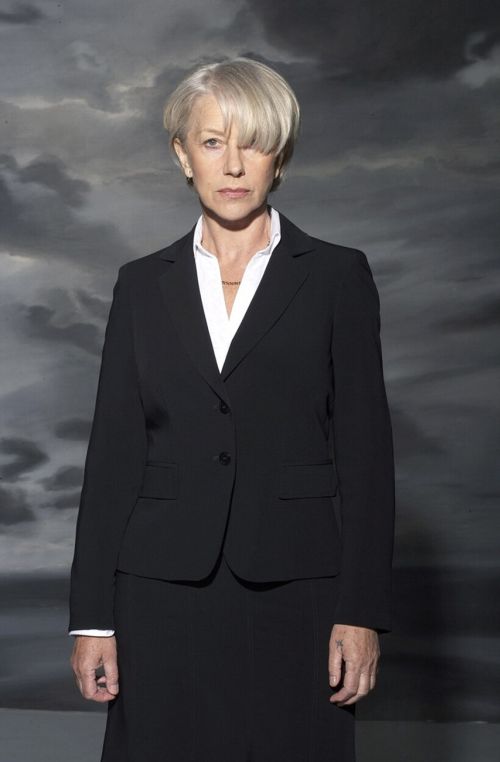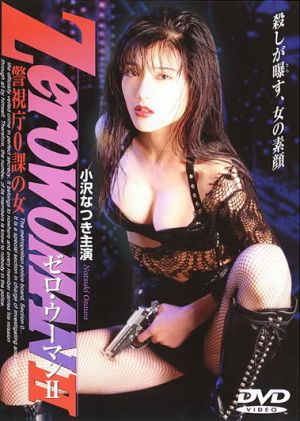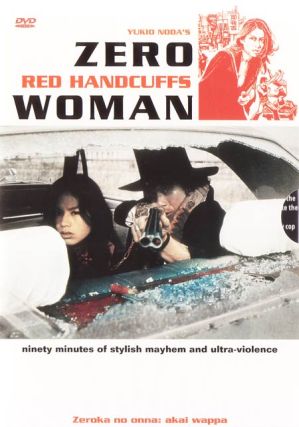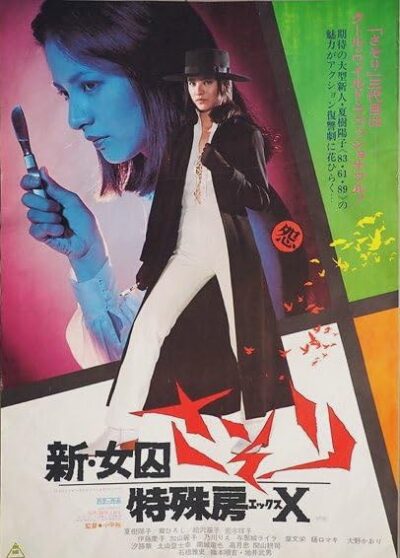
 Before there was The Cooler, before there was either version of The Killing, and obviously before there was Maria Bello’s short-lived Americanized take, there was Dame Helen Mirren as Jane Tennison, one of the canonical figures of action heroine television over the past two decades. Though only fifteen feature-length episodes were aired – that works out at only one a year between the show’s debut in 1991, and its finale in 2006 – it has become an archetype for its portrayal of a female detective, relentless in her pursuit of criminals, but considerably more ill at-ease and abrasive when handling the people with whom she has to work. She’s great at spotting clues, interrogating suspects and putting together the pieces. However, Tennison’s personal life is a complete mess, she screws up any relationships on an almost daily basis, and is completely incapable of striking a balance between work and everything outside it.
Before there was The Cooler, before there was either version of The Killing, and obviously before there was Maria Bello’s short-lived Americanized take, there was Dame Helen Mirren as Jane Tennison, one of the canonical figures of action heroine television over the past two decades. Though only fifteen feature-length episodes were aired – that works out at only one a year between the show’s debut in 1991, and its finale in 2006 – it has become an archetype for its portrayal of a female detective, relentless in her pursuit of criminals, but considerably more ill at-ease and abrasive when handling the people with whom she has to work. She’s great at spotting clues, interrogating suspects and putting together the pieces. However, Tennison’s personal life is a complete mess, she screws up any relationships on an almost daily basis, and is completely incapable of striking a balance between work and everything outside it.
Such a complex character requires an actress of the highest talents, and Mirren provides it. Before her film career, she cut here teeth with the Royal Shakespeare Company, though her early cinematic work includes both classic (The Long Good Friday) and entries which one suspects she’d rather forget (Caligula!). But even in the latter, she still carried herself with grace and poise, elevating the material. By the early nineties, she was respwected, yet not quite as renowned as she would become – her first Oscar nomination would not be until 1994, for The Madness of King George. Even now, Mirren acknowledges the show’s importance in her career: “It was an incredibly important part of what’s got me to where I am today. It was intense, many many hours on a set with many different directors, many different writers. I loved it, and that’s the way you learn.” Series creator Lynda LaPlante was also well established, having previously created a similarly iconic female character, on the other side of the law, in Dolly Rawlins, for her crime series, Widows.
While far from the first to portray a British female detective, the new show was a fairly-radical departure from previous entries such as Juliet Bravo or The Gentle Touch which, as the latter’s name suggests, sought to portray a kinder, gentler police force, with heroines comfortable at both home and work. LaPlante was having none of that, placing Jane Tennison in situations which contrasted her skills at police-work with her abject failures elsewhere (the show wisely chooses to focus much more on the former). Right from the start, Tennison has to prove herself in a male-dominated environment against the constant suspicion that she reached her position because of affirmative action, rather than on merit. Finding the right person for the role was crucial, LaPlante told NewsWeek in 1994, “She’s not physically heavy, but she has a strength inside her that is unusual. There’s a stillness to her, a great tension and intelligence in her face.”
One of the fascinating things about the show is the change that Tennison undergoes over the course of the series, which is particularly apparent if you watch them all in relatively short order. It would be hard to imagine an American show sticking with the same character over such a long period, but the infrequency of the production likely helps, and we see Tennison evolve over the length of the show from a somewhat tentative and naive detective, becoming hard-bitten and cynical (for very good cause), eventually ending up an alcoholic, teetering on the edge of complete burn-out and suffering from blackouts and the DTs, who is trying to solve one last case reach retirement through sheer, bloody-minded willpower. It’s a fascinating arc to watch, and I particularly appreciated the way, at the end of the final episode, the writers didn’t provide an obvious or “fluffy” ending, which could have compromised the integrity of the entire show.
“Women are taught to smile, to be pleasant, to be charming, to be attractive. Tennison doesn’t do that. She is driven, obsessive, vulnerable, unpleasantly egotistical, and confused. But she is damn good at what she does and is totally dedicated.”
— Helen Mirren |
Mirren is the sole character to appear in all the episodes. She’s supported by a swathe of faces you’ll recognize if you spend any time watching British television or movies. The first series alone included future Oscar nominees Tom Wilkinson and Ranulph Fiennes, as well as Zoe Wanamaker, and others to be seen include David Thewlis, Ciaran Hinds, Jonny Lee Miller, Mark Strong, Frank Finlay and Peter Capaldi, recently announced as the new Dr. Who [in Suspect, he plays a transvestite, which is certainly… different]. Most of the series are single stories, told over two 100-minute episodes, except for the fourth, which is a trio of individual parts. This extended length, allowing a single crime to be dissected in greater depth, is another difference to American shows, which tend very much to be “crime of the week,” with or without also a longer story arc.
 While all the cases are homicides, they cover a wide breadth. After the first season, there tended to be an underlying social issue: this could be racial, political or class-based, and often provide an additional level of difficulty to the investigation. Particularly in the early seasons, Tennison is depicted as having to fight prejudice from her colleagues. The feminist aspects (perhaps thankfully) do fade somewhat, once she becomes more established, though the level of support she gets from her superiors is never something on which she can rely. Throughout, she struggles with self-doubt and loneliness in her position, no-one able to understand the pressures of the job, and help share the burden on her shoulders. But part of her strength is that it never interferes with her dedication to the case, or her pursuit of those responsible for wrong-doing. Unlike a good number of her colleagues, who are sometimes prepared to sacrifice justice for the sake of expediency, Tennison’s morality is absolute, and she won’t compromise it for anything, regardless of the potential personal cost.
While all the cases are homicides, they cover a wide breadth. After the first season, there tended to be an underlying social issue: this could be racial, political or class-based, and often provide an additional level of difficulty to the investigation. Particularly in the early seasons, Tennison is depicted as having to fight prejudice from her colleagues. The feminist aspects (perhaps thankfully) do fade somewhat, once she becomes more established, though the level of support she gets from her superiors is never something on which she can rely. Throughout, she struggles with self-doubt and loneliness in her position, no-one able to understand the pressures of the job, and help share the burden on her shoulders. But part of her strength is that it never interferes with her dedication to the case, or her pursuit of those responsible for wrong-doing. Unlike a good number of her colleagues, who are sometimes prepared to sacrifice justice for the sake of expediency, Tennison’s morality is absolute, and she won’t compromise it for anything, regardless of the potential personal cost.
Obviously, this isn’t “action” in the “fisticuffs and car-chase” mould of policework (I’ll refer you to Red and its sequel if you want to see Mirren wielding the heavy weaponry!). Virtually the only weapons Tennison wields are her mind and her tongue, but it’s hard to tell which is the sharper, and they are both undeniably effective at getting to the truth, no matter how deeply it may be hidden. Her bravery is undeniable, not just in the perpetual quest for justice mentioned above, but her willingness to put herself into potentially lethal situations when the need arises., such as at the end of the fifth series where she faces an armed suspect, alone and without anything to protect her. While it’s one thing to go into such situations with the physical presence to handle them, doing so when you don’t have such an ability, is probably even more courageous.
Though some episodes are now more than 20 years old, they hardly seem dated at all: the writing is still sharp as a razor, and can stand with anything you’ll find on television today. But it’s Mirren’s performance which makes this work, and is why I just didn’t bother with the US remake; good though Bello might be, she can’t hold a candle to the original. There’s a reason Mirren was nominated for six Emmys, winning two, and six BAFTAs, taking home three. Virtually every cop show with a female lead which has come out since – or, at least, all the good ones – owe something to Prime Suspect, and a central character who embodies the tension between work and home life. Never shying away from the darker side of law-enforcement, or the toll it exerts on those who maintain it, this isn’t just one of the best recent action heroine TV series, it’s among the best TV series of any genre or era.
 When not spinning platters as the DJ at a tango club in Chile, Santiago Fernández (Oviedo) likes nothing better than to kill, rob and steal – at least, from the comfort of his couch, as he plays a game just dissimilar enough to Grand Theft Auto to avoid a lawsuit. There is, of course, a huge difference between video-game malfeasance and the real thing, as he discovers after being unfortunate enough to overhear a conversation of local crime boss Che Longana (Alis), in which he makes the titular request, said skull belonging to his ex-girlfriend (Urrejola), who is also an assassin of no mean talent. Caught eavesdropping, Santiago’s escapes execution by promising to deliver her to Longana – a task for which he is woefully unprepared, despite the countless hours of console practice for a life of crime.
When not spinning platters as the DJ at a tango club in Chile, Santiago Fernández (Oviedo) likes nothing better than to kill, rob and steal – at least, from the comfort of his couch, as he plays a game just dissimilar enough to Grand Theft Auto to avoid a lawsuit. There is, of course, a huge difference between video-game malfeasance and the real thing, as he discovers after being unfortunate enough to overhear a conversation of local crime boss Che Longana (Alis), in which he makes the titular request, said skull belonging to his ex-girlfriend (Urrejola), who is also an assassin of no mean talent. Caught eavesdropping, Santiago’s escapes execution by promising to deliver her to Longana – a task for which he is woefully unprepared, despite the countless hours of console practice for a life of crime.




 Confusingly titled in the West, without any indication it wasn’t the first of the rebooted franchise, this perhaps explains why there’s little or no explanation of… Well, anything, really. What is Section Zero? Who is Rei? Where did she come from? “Never mind about that,” seems to be the film’s attitude, “Here are Natsuki Ozawa’s breasts to distract you from such trifles.” That’s particularly the case early on, when it seems Rei is unable to go five minutes without showing them off, whether it’s through being molested, becoming inescapably randy or simply taking a soapy shower (to wash off the blood after a kill, so I guess it’s a shower necessary to the plot – it also replays the intruder shower scene from its predecessor, with a different ending).
Confusingly titled in the West, without any indication it wasn’t the first of the rebooted franchise, this perhaps explains why there’s little or no explanation of… Well, anything, really. What is Section Zero? Who is Rei? Where did she come from? “Never mind about that,” seems to be the film’s attitude, “Here are Natsuki Ozawa’s breasts to distract you from such trifles.” That’s particularly the case early on, when it seems Rei is unable to go five minutes without showing them off, whether it’s through being molested, becoming inescapably randy or simply taking a soapy shower (to wash off the blood after a kill, so I guess it’s a shower necessary to the plot – it also replays the intruder shower scene from its predecessor, with a different ending).
 Before there was The Cooler, before there was either version of The Killing, and obviously before there was Maria Bello’s short-lived Americanized take, there was Dame Helen Mirren as Jane Tennison, one of the canonical figures of action heroine television over the past two decades. Though only fifteen feature-length episodes were aired – that works out at only one a year between the show’s debut in 1991, and its finale in 2006 – it has become an archetype for its portrayal of a female detective, relentless in her pursuit of criminals, but considerably more ill at-ease and abrasive when handling the people with whom she has to work. She’s great at spotting clues, interrogating suspects and putting together the pieces. However, Tennison’s personal life is a complete mess, she screws up any relationships on an almost daily basis, and is completely incapable of striking a balance between work and everything outside it.
Before there was The Cooler, before there was either version of The Killing, and obviously before there was Maria Bello’s short-lived Americanized take, there was Dame Helen Mirren as Jane Tennison, one of the canonical figures of action heroine television over the past two decades. Though only fifteen feature-length episodes were aired – that works out at only one a year between the show’s debut in 1991, and its finale in 2006 – it has become an archetype for its portrayal of a female detective, relentless in her pursuit of criminals, but considerably more ill at-ease and abrasive when handling the people with whom she has to work. She’s great at spotting clues, interrogating suspects and putting together the pieces. However, Tennison’s personal life is a complete mess, she screws up any relationships on an almost daily basis, and is completely incapable of striking a balance between work and everything outside it. While all the cases are homicides, they cover a wide breadth. After the first season, there tended to be an underlying social issue: this could be racial, political or class-based, and often provide an additional level of difficulty to the investigation. Particularly in the early seasons, Tennison is depicted as having to fight prejudice from her colleagues. The feminist aspects (perhaps thankfully) do fade somewhat, once she becomes more established, though the level of support she gets from her superiors is never something on which she can rely. Throughout, she struggles with self-doubt and loneliness in her position, no-one able to understand the pressures of the job, and help share the burden on her shoulders. But part of her strength is that it never interferes with her dedication to the case, or her pursuit of those responsible for wrong-doing. Unlike a good number of her colleagues, who are sometimes prepared to sacrifice justice for the sake of expediency, Tennison’s morality is absolute, and she won’t compromise it for anything, regardless of the potential personal cost.
While all the cases are homicides, they cover a wide breadth. After the first season, there tended to be an underlying social issue: this could be racial, political or class-based, and often provide an additional level of difficulty to the investigation. Particularly in the early seasons, Tennison is depicted as having to fight prejudice from her colleagues. The feminist aspects (perhaps thankfully) do fade somewhat, once she becomes more established, though the level of support she gets from her superiors is never something on which she can rely. Throughout, she struggles with self-doubt and loneliness in her position, no-one able to understand the pressures of the job, and help share the burden on her shoulders. But part of her strength is that it never interferes with her dedication to the case, or her pursuit of those responsible for wrong-doing. Unlike a good number of her colleagues, who are sometimes prepared to sacrifice justice for the sake of expediency, Tennison’s morality is absolute, and she won’t compromise it for anything, regardless of the potential personal cost. Probably the least accurate title of any film ever – at least Friday the 13th put out a few movies before using “final” – you definitely should begin here if you’re looking for much coherence. Rei (Iijima) is now partly employed as secretary to the head of Section Zero, but also takes out criminals for whom traditional channels of law enforcement aren’t enough, for one reason or another. She also pals around with Takako (Fukuoka), a detective from another section and a girl he helped bring out of delinquency, in what’s vaguely intimated as a love triangle. One night, they witness a hit and run, and discover the perpetrator (Suzuki) is the daughter of a powerful economic figure. Despite encountering official resistance, Rei and Takako persist with their investigation and, inevitably, this brings out more robust sanctions.
Probably the least accurate title of any film ever – at least Friday the 13th put out a few movies before using “final” – you definitely should begin here if you’re looking for much coherence. Rei (Iijima) is now partly employed as secretary to the head of Section Zero, but also takes out criminals for whom traditional channels of law enforcement aren’t enough, for one reason or another. She also pals around with Takako (Fukuoka), a detective from another section and a girl he helped bring out of delinquency, in what’s vaguely intimated as a love triangle. One night, they witness a hit and run, and discover the perpetrator (Suzuki) is the daughter of a powerful economic figure. Despite encountering official resistance, Rei and Takako persist with their investigation and, inevitably, this brings out more robust sanctions. When the series started in 1974, it originally appeared to be trying to take on the Female Convict Scorpion series at its own game – both were inspired by Toru Shinohara manga series. However, going by the fact it took more than two decades for a second entry in the series, I can only presume the commercial returns weren’t anywhere near as strong. This starts off well, with policewoman Rei (Sugimoto) luring in, and then blowing away, the man responsible for torturing and killing another woman. Turns out the perpetrator was a diplomat and in the resulting scandal, Rie is sent to jail. Her chance at redemption comes when a gang of thugs stumble into the kidnapping of the daughter of a politician (Tamba): to avoid a scandal, Rie is offered a pardon if she infiltrates the kidnappers and kills them all. Initially, all goes to plan, with the first member taken out quickly, but it soon becomes clear the other members are rampaging psychos, and the situation rapidly spirals out of control, to the point where the politician yanks his support and orders the deaths of everyone, in the name of damage limitation – including both his daughter and Rie.
When the series started in 1974, it originally appeared to be trying to take on the Female Convict Scorpion series at its own game – both were inspired by Toru Shinohara manga series. However, going by the fact it took more than two decades for a second entry in the series, I can only presume the commercial returns weren’t anywhere near as strong. This starts off well, with policewoman Rei (Sugimoto) luring in, and then blowing away, the man responsible for torturing and killing another woman. Turns out the perpetrator was a diplomat and in the resulting scandal, Rie is sent to jail. Her chance at redemption comes when a gang of thugs stumble into the kidnapping of the daughter of a politician (Tamba): to avoid a scandal, Rie is offered a pardon if she infiltrates the kidnappers and kills them all. Initially, all goes to plan, with the first member taken out quickly, but it soon becomes clear the other members are rampaging psychos, and the situation rapidly spirals out of control, to the point where the politician yanks his support and orders the deaths of everyone, in the name of damage limitation – including both his daughter and Rie. If the first Queen Bee movie was a fairly effective romp through the genre, that’s a lot less the case fot the follow-up, with Ike largely floundering around, as Maki, the leader of the Pearl Gang, who finds herself embroiled in a battle with another crew, the Black Lilies and their leader, Yuri (Kazama). Their spat is interrupted, when the Kuroji clan of yakuza throw their weight behind the Black Lilies. However, the triumph of the Lilies is short-lived, as they find out that they are about to be forced into life as prostitutes, for the benefit of their new allies, ending their life of freedom in the ‘hood. There are also subplots in which Yuri’s former boyfriend, Eizo wants to be a top racing driver, bringing him into conflict with the yakuza as well, and a suitcase filled with stolen guns.
If the first Queen Bee movie was a fairly effective romp through the genre, that’s a lot less the case fot the follow-up, with Ike largely floundering around, as Maki, the leader of the Pearl Gang, who finds herself embroiled in a battle with another crew, the Black Lilies and their leader, Yuri (Kazama). Their spat is interrupted, when the Kuroji clan of yakuza throw their weight behind the Black Lilies. However, the triumph of the Lilies is short-lived, as they find out that they are about to be forced into life as prostitutes, for the benefit of their new allies, ending their life of freedom in the ‘hood. There are also subplots in which Yuri’s former boyfriend, Eizo wants to be a top racing driver, bringing him into conflict with the yakuza as well, and a suitcase filled with stolen guns. Recent high-school graduate Cassie (Cobb) works at a bank alongside her mother (Quinlan), bickering about the usual things, such as whether to go to college or not. This mundance existence is suddenly interrupted by a robbery: Cassie is stunned to realize the raiders are actually some of her school friends. When they realize this, the girls are forced to take her along, and she discovers the cause of the crime – the father of one (Thomson) has been kidnapped while on business in Mexico. Meanwhile, Mom is tracking down her kidnapped daughter, FBI agent Mendoza (Blasi) is also on the hunt, and one of the girl gang has her own plans for the ill-gotten gains, which doesn’t involve any ransom.
Recent high-school graduate Cassie (Cobb) works at a bank alongside her mother (Quinlan), bickering about the usual things, such as whether to go to college or not. This mundance existence is suddenly interrupted by a robbery: Cassie is stunned to realize the raiders are actually some of her school friends. When they realize this, the girls are forced to take her along, and she discovers the cause of the crime – the father of one (Thomson) has been kidnapped while on business in Mexico. Meanwhile, Mom is tracking down her kidnapped daughter, FBI agent Mendoza (Blasi) is also on the hunt, and one of the girl gang has her own plans for the ill-gotten gains, which doesn’t involve any ransom. Reiko (Ike) is leader of the Athens Gang, a low-level all-girl gang, who specialize in car thefts and rolling naive salarymen with the lure of hot sex. They’re part of a hierarchy, which includes a male gang under whom they loosely operate, who are in turn on the fringes of a Yakuza group. There’s also a motor-cycle gang and its leader (Taki) who don’t obey anyone, and that independence is really what Reiko wants, even though her group is obliged to follow certain rules, such as not getting attached to any man. Things are disrupted by the return of former leader Jun (Kagawa) from reform school: will Reiko be able to hold on to her position? It’s just one of a large number of plot threads here: you also get the blackmail of a pop star; a hitman agreeing to one last mission; a gangster estranged from his wife and daughter; sex on motorcycles for no apparent reason; a journalist with a nose for scandal; and, of course Reiko failing to follow her own rule about no attachments.
Reiko (Ike) is leader of the Athens Gang, a low-level all-girl gang, who specialize in car thefts and rolling naive salarymen with the lure of hot sex. They’re part of a hierarchy, which includes a male gang under whom they loosely operate, who are in turn on the fringes of a Yakuza group. There’s also a motor-cycle gang and its leader (Taki) who don’t obey anyone, and that independence is really what Reiko wants, even though her group is obliged to follow certain rules, such as not getting attached to any man. Things are disrupted by the return of former leader Jun (Kagawa) from reform school: will Reiko be able to hold on to her position? It’s just one of a large number of plot threads here: you also get the blackmail of a pop star; a hitman agreeing to one last mission; a gangster estranged from his wife and daughter; sex on motorcycles for no apparent reason; a journalist with a nose for scandal; and, of course Reiko failing to follow her own rule about no attachments. The comparisons of Takigawa to Lazenby above proved appropriate in another way, both being canned after one entry playing the iconic title character, which is probably just as symptomatic of something. The replacement here as Nami Matsushima is Natsuki, who seems to go back toward a more taciturn heroine, closer to the original. But it’s, effectively, another reboot, with not even a nod to the previous entry. In this case, the heroine is a nurse, framed for her involvement in the hospital murder of a politician who was threatening to expose corrupt practices.
The comparisons of Takigawa to Lazenby above proved appropriate in another way, both being canned after one entry playing the iconic title character, which is probably just as symptomatic of something. The replacement here as Nami Matsushima is Natsuki, who seems to go back toward a more taciturn heroine, closer to the original. But it’s, effectively, another reboot, with not even a nod to the previous entry. In this case, the heroine is a nurse, framed for her involvement in the hospital murder of a politician who was threatening to expose corrupt practices. Just goes to show that the “cinematic reboot” is not a 21st-century invention, e.g. Batman or James Bond. For a mere three years after Meiko Kaji showed her sting as Nami, the studio reset the series, giving it a new director, new (and much more talkative) lead actress, and returning Nami Matsushima to a happy, criminal record-free young women, with a loving boyfriend. Except, of course, he turns out not to love her quite as much. Things start to collapse after her sister uncovers evidence of major government corruption, and passes it to Nami, shortly before being kidnapped. After Nami uncovers the truth – her sister is killed and she is framed for the murder, with the help of her boyfriend, and sentenced to 15 years in prison. Initially an easy mark for the tough girls in her cell, Nami soon develops her mean streak. And she’s going to need it, because the politician behind it all is looking to tidy up the loose end she represents, by killing her and making the death look like a suicide. Name turns the tables, in incendiary fashion, and it’s clear that she’s one loose end that won’t be quietly disposed of.
Just goes to show that the “cinematic reboot” is not a 21st-century invention, e.g. Batman or James Bond. For a mere three years after Meiko Kaji showed her sting as Nami, the studio reset the series, giving it a new director, new (and much more talkative) lead actress, and returning Nami Matsushima to a happy, criminal record-free young women, with a loving boyfriend. Except, of course, he turns out not to love her quite as much. Things start to collapse after her sister uncovers evidence of major government corruption, and passes it to Nami, shortly before being kidnapped. After Nami uncovers the truth – her sister is killed and she is framed for the murder, with the help of her boyfriend, and sentenced to 15 years in prison. Initially an easy mark for the tough girls in her cell, Nami soon develops her mean streak. And she’s going to need it, because the politician behind it all is looking to tidy up the loose end she represents, by killing her and making the death look like a suicide. Name turns the tables, in incendiary fashion, and it’s clear that she’s one loose end that won’t be quietly disposed of.